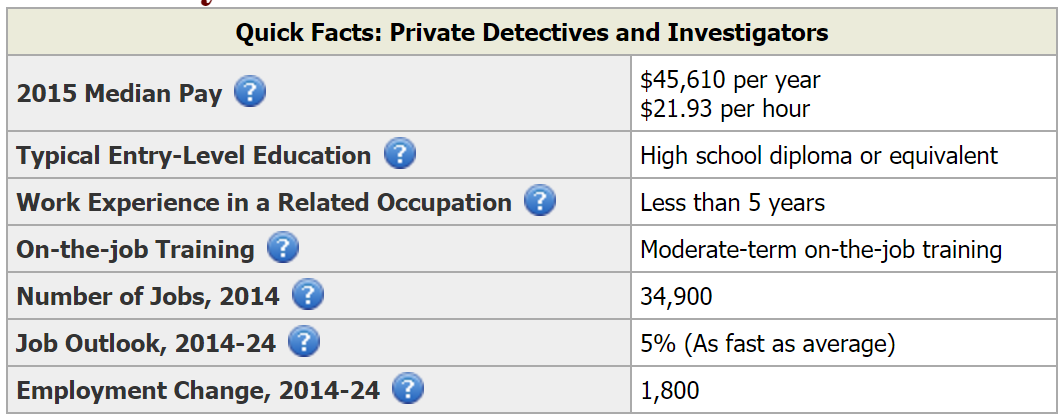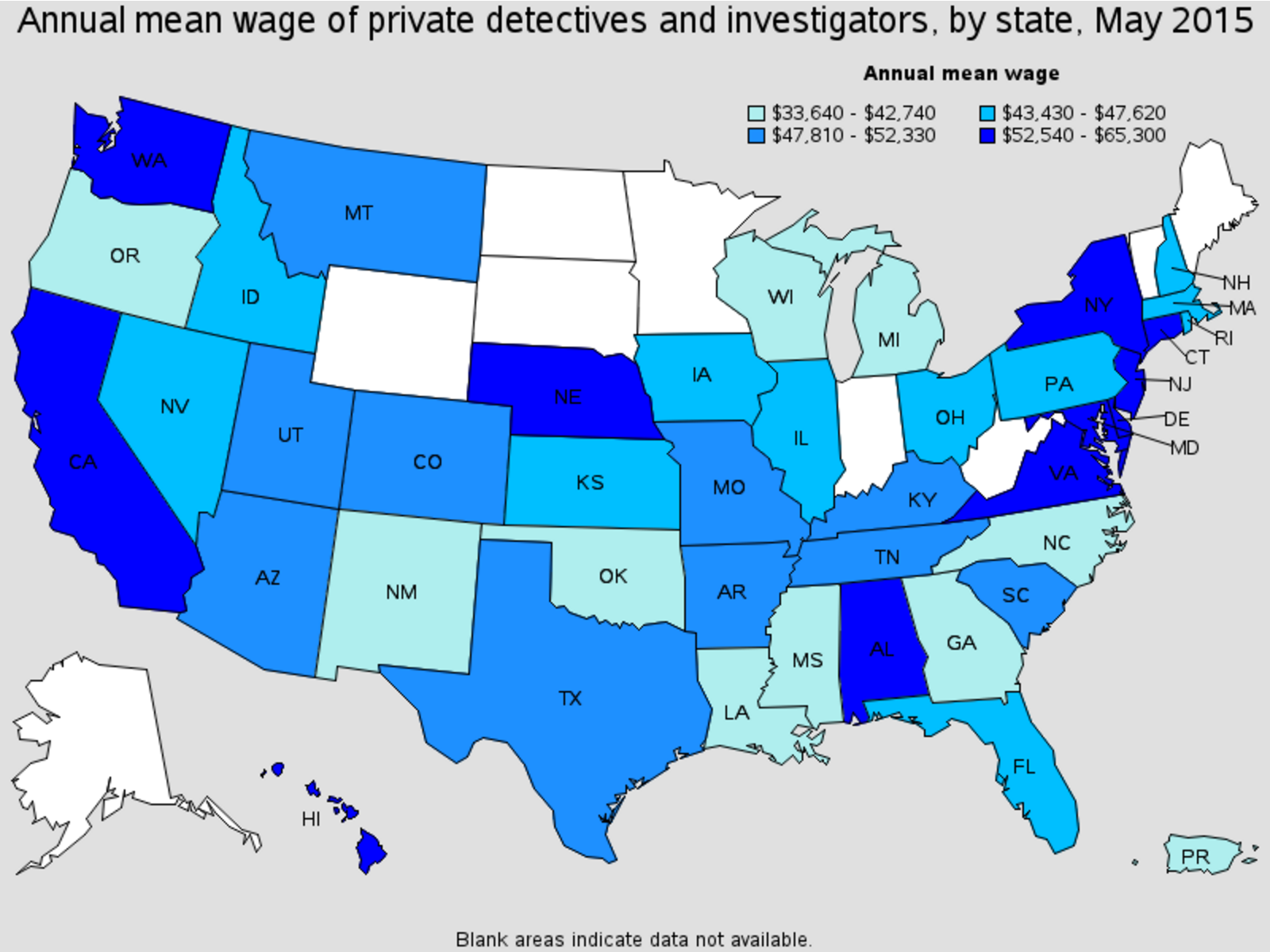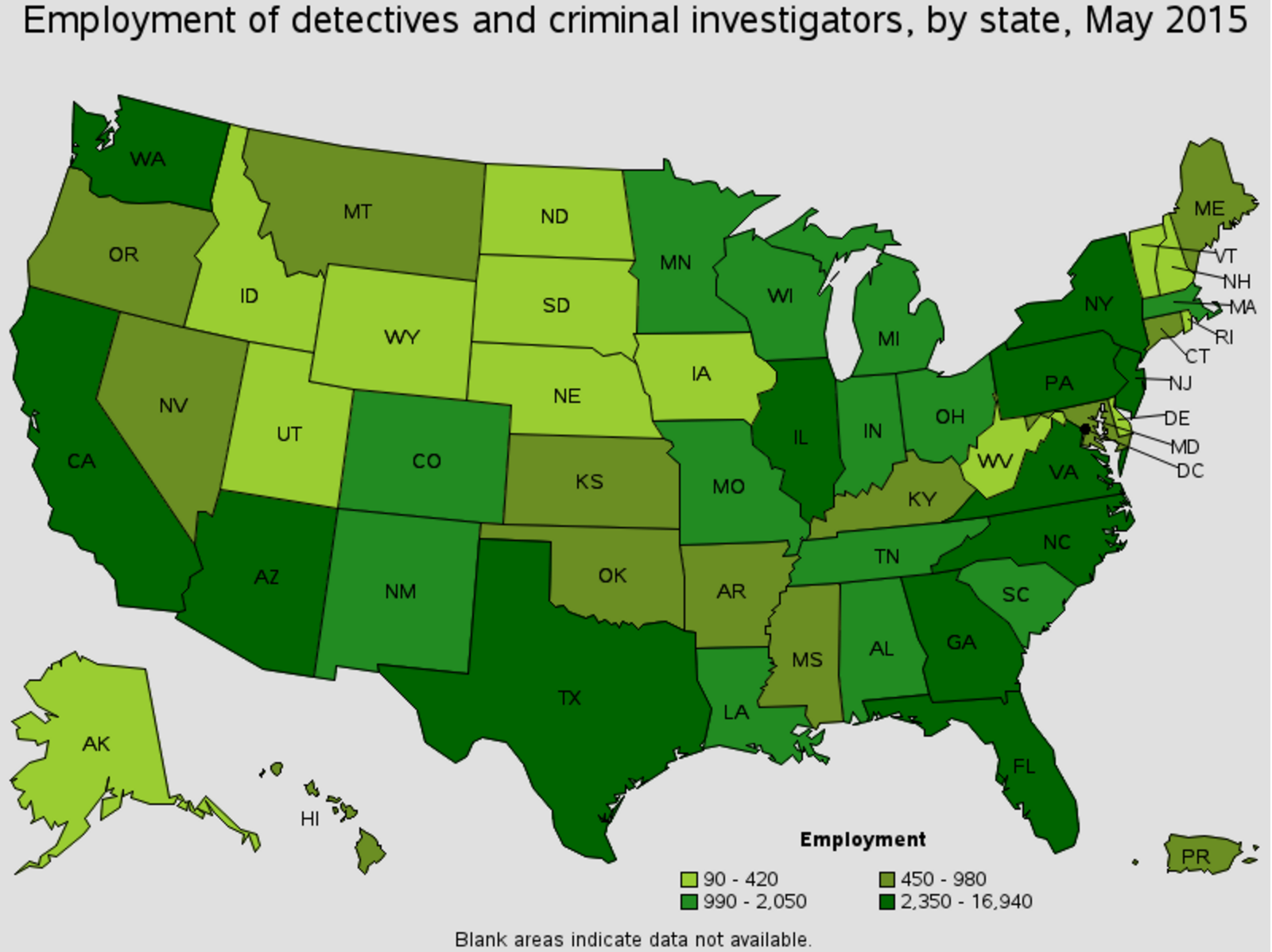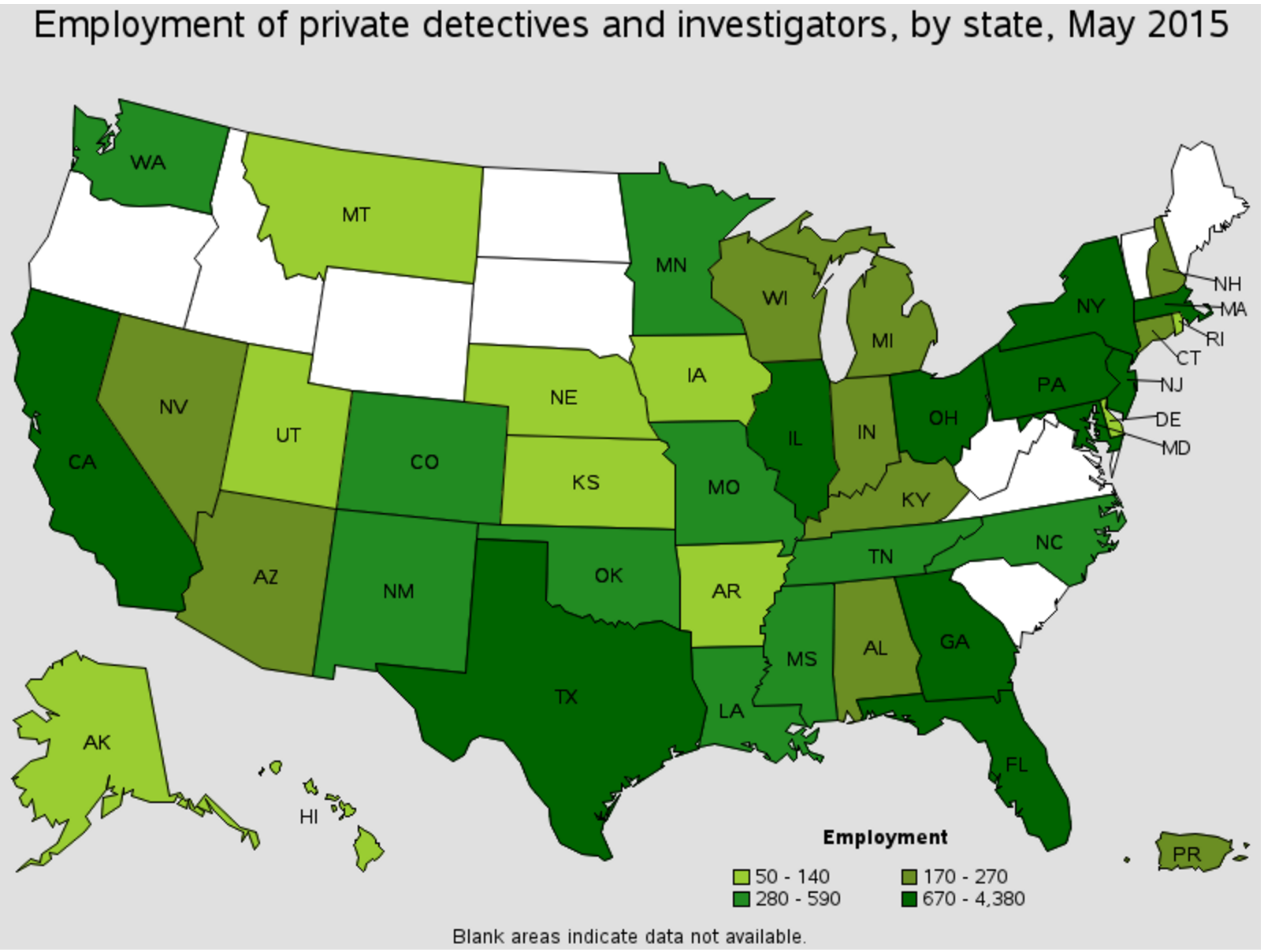Becoming a detective is a dream for those who grow up watching detective and serial movies. After knowing the character of Sherlock Holmes, we assume to be like him. However, we turn this dream into a reality along the way. In recent years, due to the increased rate of crime, there is a greater need for detectives to solve them. This is the reason why some police officers are trying to be like Sherlock Holmes. For those of you who still haven’t given up on your detective dreams, here is some information on the exciting career of being a detective.


Table Of Contents
- Average Detective Salary
- Detective Career Outlook
- How To Become A Detective
- Detective Job Description
How Much Does A Detective Make
The base salary of a detective first depends on his or her employer. Usually, a state employed investigator has higher earnings compared to a private one. This is because a private detective has intermittent work while the state employed has a steady work. The national average for a state-employed detective is $76,000. Whereas the average salary for a private detective can be around $45,000. The factors that affect a PI’s salary will be discussed later. Here are the factors that affect the salary of investigators that are state employed.
[asd_program_button /]Size of population
The income of a detective depends on the population of a city the same to that of the police officers. The number of cases to be handled by a detective increases if the city is more populated. Thus, the increase in salary. One of the major factors in deciding the salary of an investigator is the crime rate. For instance, someone in the LA police department will get an average salary of $44,000 to $88,000. In contrast, for someone in Miami Police department, the average salary tends to be around $86,000 to $107,000.

Location of job
The location is just the same us with the population of the place and rate of the crime. However, another factor comes into play in such conditions – cost of living. Higher the cost of living in a certain location, higher the detective is paid. This is true with the case of private investigators as well. A pay of $116,00 is usually received by employees in District of Columbia, Alaska and New Jersey.
Education background
For any police job (except at the federal level), a high school degree is sufficient. Though this rules sometimes varies with state, most states do not require higher education certificates. However, officers and detectives are paid more if they have a degree after high school as there are states and departments who consider higher education important. This may be an associate’s, bachelor’s or even a master’s degree. You will be paid more depending on your degree.
Number of years in the field
Your length of stay in the field will be a consideration on how much you will earn as an investigator. An increase of up to $20,000 will be given to those who work in the field for 20 years if they don’t get a promotion. But if you are promoted as a Police Chief, you will be paid about $180,000 per year.
Agency Private Investigators
A private investigator’s salary depends on the number of cases he or she takes and solves. As mentioned before, the location can affect the price along with the many other factors such as the amount of discretion needed, the amount of danger involved, extra equipment required and many other things. The investigator will quote the job price after the clients presented their problem.

You will know here that a state-employed detective’s income is steady and through various means it can be increased. On the other hand, a private investigator’s salary is quite unpredictable and will only increase if he or she is already popular or known. Now that you have the financial facts, you can decide which path to choose.
Agency Detective’s Career Path
What we are going to talk about first is the growth in the fields. There were about 106,000 public detectives or criminal investigators on record in 2015. There were about 30,000 private investigators who do the same job on record. In this industry, the predicted growth of private detectives is about 15%. This means that there will be about 1,500 new jobs open by 2025. This is the same growth rate of 5% in different sectors. On the other hand, for public investigators, this figure is at 4%. This goes to show that 4,000 more jobs as a criminal investigator is expected in 2025. This can be considered as an average rate of growth as well.
[asd_program_button /]The steady increase in employment is mainly due to the increase in population. As the population increases, more people need to be protected and more criminals need to be caught. But due to the strict implementation of laws and technology are more advanced, the crime rate is not increasing that much. Hence, there is a balance in each other, which leads to average growth in both careers.

The highest number of Criminal/Law Enforcement Investigators are found in Texas, California and New York. Western states and Texas show more employment here than the eastern ones. Private detectives in California, Texas and Florida with the southern part are higher in number compared to the northern ones.
Let’s move on to the industries that hire most of these two professionals. As clear as day, The Local, State government and the Federal branch employ the most number of criminal investigators. On the other hand, private detectives are usually hired by Security Services, Consulting services and occasionally by the local government for consultation on a few cases.
When it comes to finance, criminal investigators are paid more compared to the private ones. The annual average salary of criminal investigators is $80,000 while Private investigators get $52,000. When you combine the aspects of geography and finance, you see that District of Columbia, Alaska, and New Jersey paid the most (6 figure salaries) for Public investigators. Private detectives were paid most in Alabama, Nebraska, and New Jersey.
Comparing with different industries again, we see that for private industries, the most employing industries do not pay the highest. SinceElectromedical, Navigational, Power generation, Metal Product forming and other such industries have to protect sensitive information that is why pirvate detective are paid most by them. For public investigators, they are paid most by federal agencies, postal services, and educational institutes.

How can You Qualify as a Detective In Agency
Keep in mind that there are two kinds of detectives. Some of them are private investigators who can be hired by the general public to investigate on certain things. The others are employed by the government and reach this post after being promoted from a police officer. We are going to explore here the different avenues.
[asd_program_button /]Complete High School
A detective is generally a police officer who has been promoted to that position because of his or her skills of deduction. Hence if you want to become a detective, it is generally necessary to graduate from high school and enlist in the police force. To become a private investigator, a high school degree is a must too.
Get your Bachelor’s Degree
In most cases, enlisting in the police force won’t require a bachelor’s degree. Although some officers would like to have other means of employment right after retirement. A bachelor’s degree is also required to pursue any jobs at the federal level or become a detective.
Many institutions require applicants to have a bachelor’s degree in law, criminal justice or psychology to become a detective. Anyone with an associate’s degree is given training up to 5000 hours. But for someone with a bachelor’s degree, the required training is only 4000 hours.
Get the right amount of experience
You need to experience working as an investigator first before you can become a professional detective. There are many ways to get this. However, the most common way is to be employed by the government first. If you have any experience as an arson investigator, criminal investigator or a law enforcement investigator, you are qualified as a person with experience. Working as an office investigator or as a licensed repossessor will count as well.
There might be variations in the required experience in the state you’re applying in. A state might require at least 3 years of experience, but in some it could be as long as 5 years.
Own a gun legally
Investigators that aren’t licensed by the state aren’t allowed to carry firearms without a permit. Some firearms require a full training course after which they are issued with the permits. Therefore if you want to own a firearm while working as an investigator, completing the training course is necessary to get your own permit.
Obtain Missouri licensure
After completing all the education and experience requirements, you are required to undergo a state licensing test. This test usually contains some multiple choice questions about state laws and some procedures that often need to be carried out. This examination is only for aspiring private detectives. After passing this test, you are officially a private investigator with a license.
Get Missouri Insurance
Being a detective is dangerous, hence it is a good idea to get your insurance. Basically, this is a medical insurance worth $10,000. However, it is important to also get a higher amount if you carry a firearm since you need to protect yourself from greater dangers and insure the gun itself.
By completing these steps, you’ll be good to go. You can now start living the detective life you always wanted. However, don’t forget that being a detective would mean exposing yourself to danger. If that doesn’t scare you away, then you should fulfill all the requirements as soon as possible.
What Does A Detective Do In Agency?
Crime Scene Investigation
One of the main duties of a detective is to analyze a crime scene and deduce certain assumptions from it. The detectives find and bag evidence at the scene of the crime. Supposedly, they should collect anything that looks like an evidence which can be used in court hearings later. Sometimes the forensic investigation department lends them a hand in analyzing the evidence and thus helping them deduce more things about the crime. Detectives should gather as many clues and evidences as possible by analyzing cameras and gathering information from eye witnesses.
[asd_program_button /]Criminal Research
Doing research regarding previous cases is regarded as an important aspect of a detective’s job. Through this, they can get to the mind of a criminal and discover any hidden clues and patterns. This involves looking into previous case records to allow them to have an insight regarding the behavior of the criminal. This is really helpful when it comes to serial killers. This is also applicable when it comes to knowing what tactics a drug cartel is up to. Through the help of general research, it will be a lot easier for detectives to identify the culprit or make any accurate deductions.
Narrowing down suspects
The whole objective of everything that a detective does is to serve justice to the person who has committed the crime. But to do this, they first need to a list of possible suspects. In some cases, it could include over a hundred people, but there are also cases where there is none. They create this suspect list by drawing conclusions from the evidence gathered at the crime, eyewitnesses, research and a bit of criminal/forensic psychology. The list will then be narrowed down by interrogating suspects one after another. After they narrow it down as much as possible, they collect hard evidence or get the suspect to confess to the crimes.
Testifying In Court
One of the final jobs of a detective on a case is to ensure that justice is served. The court will sometimes summon the detective to the court to aid with the process. They either narrate a possible scenario of how the crime was committed, describe how the evidence incriminates the suspect or provide their expert views on certain topics. There are also cases where the one at fault will be escorted by the detective.
Agency Private Detectives
All the above duties were that of a public detective or a law enforcement detective. A private detective’s job description is a bit loose. Supposedly, detectives should meet their client’s needs regardless of how difficult it might seem, especially in terms of research. However, they can only go as far as certain laws will allow them when going on with their job. Some of the reasons why private detectives are hired include doing background checks, tracking finances, and even collecting clues and evidence to be used against a certain person. When carrying out duties as a detective, they should make sure not to look suspicious and act like a normal citizen. Detectives are also prohibited from arresting an individual.
Basically, you can see that the television has been portraying detectives properly for the most part. But the jobs that these detectives (private and public) must undergo daily are stressful beyond comparison. Such things aren’t even shown on the TV. Detectives should make sure to find any clue they could get since a lot of people’s lives lie on them. If you think being a detective is the right job for you, then you should do research about it now!
